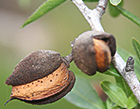California almonds could become carbon-neutral or even carbon-negative if growers were to make full use of practices such
 as shell, hull, and biomass recycling, according to new research in the Journal of Industrial Ecology. Eighty percent of the world’s almonds come from the drought-stricken state, and production operations there have drawn much ire since studies showed that almonds are a particularly water-intensive crop. However, the new research shows that the energy and greenhouse gas footprints of almonds can be lessened by, for example, using shells, hulls, and orchard biomass to generate electricity or feed dairy cows. “Our research shows 1 kilogram of California almonds typically results in less than 1 kilogram of CO2 emissions,” said author Alissa Kendall, which is “a lower carbon footprint than many other nutrient- and energy-dense foods.”
as shell, hull, and biomass recycling, according to new research in the Journal of Industrial Ecology. Eighty percent of the world’s almonds come from the drought-stricken state, and production operations there have drawn much ire since studies showed that almonds are a particularly water-intensive crop. However, the new research shows that the energy and greenhouse gas footprints of almonds can be lessened by, for example, using shells, hulls, and orchard biomass to generate electricity or feed dairy cows. “Our research shows 1 kilogram of California almonds typically results in less than 1 kilogram of CO2 emissions,” said author Alissa Kendall, which is “a lower carbon footprint than many other nutrient- and energy-dense foods.”

Almonds growing in an orchard